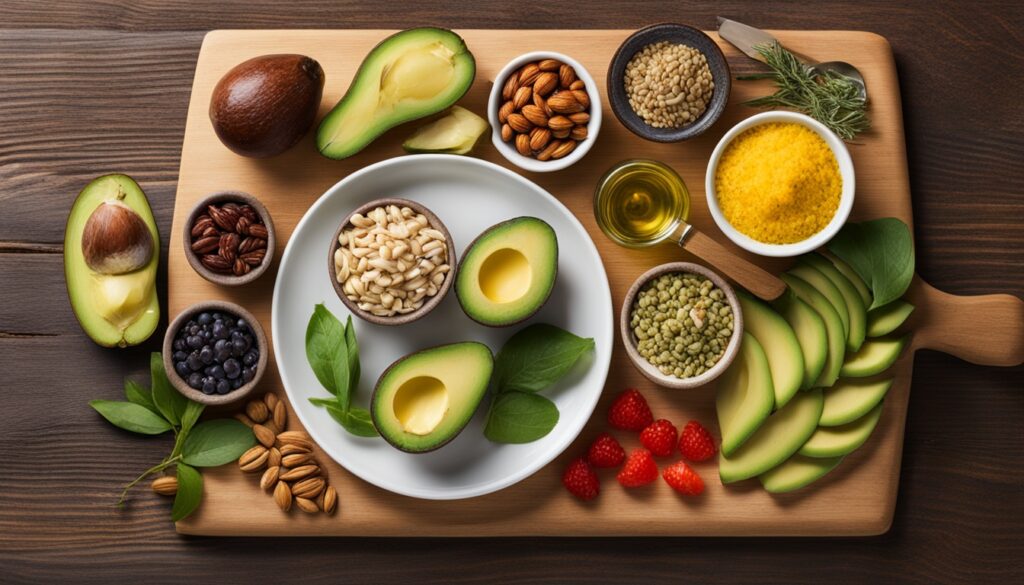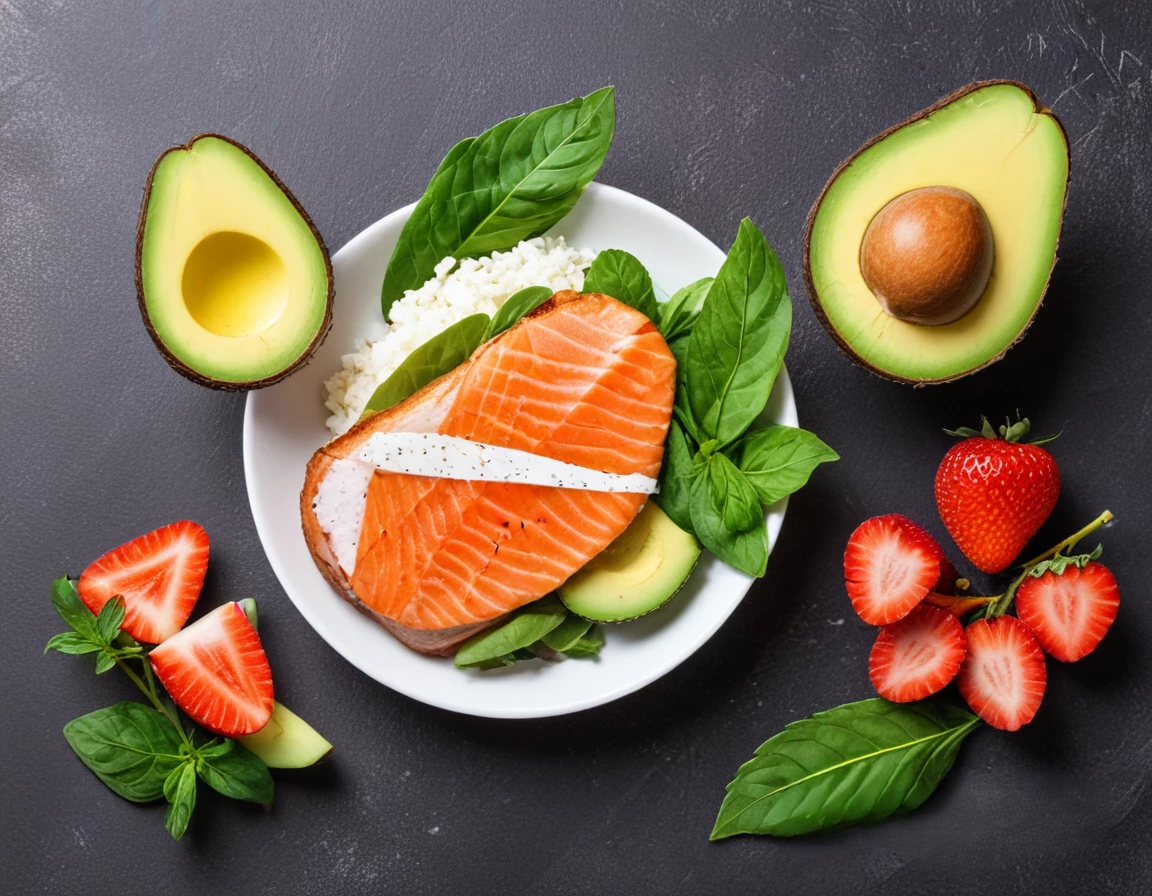Did you know that patients following a bariatric meal plan should aim for 70-90g of protein daily? This helps keep muscle mass while losing weight. A well-planned diet is key for your weight loss surgery journey. This guide offers free bariatric meal plans and tips for eating right after surgery for long-term health.
Key Takeaways
- Bariatric meal plans focus on balancing protein, carbohydrates, and healthy fats to support weight loss and overall well-being.
- Protein intake is crucial, with a minimum of 60 grams recommended daily to preserve muscle mass.
- Portion sizes should gradually increase from ¼ -½ cup to ¾ -1 cup per meal as you transition from liquid to solid foods.
- Emphasis is placed on non-starchy vegetables, low-fat dairy, and lean proteins, while limiting high-fat and high-sugar foods.
- Proper hydration, with 48-64 ounces of sugar-free fluids per day, is essential for digestion and preventing dehydration.
Understanding the Bariatric Diet
Starting a bariatric journey means learning about the diet that helps with weight loss and staying healthy. This diet makes sure you get the nutrients you need while keeping calories low. This helps with losing weight in a way that lasts.
Importance of a Balanced Meal Plan
For bariatric patients, eating a balanced diet is key. Your meals should have the right mix of protein, vegetables, fruits, starches, and healthy fats. This balance is important for getting all the nutrients you need, avoiding shortages, and staying healthy while losing weight.
Transitioning from Liquid to Solid Foods
Moving from liquids to solids after weight loss surgery is a step-by-step process. Your healthcare team will guide you with bariatric diet guidelines. They’ll tell you when to add different foods back into your diet. This careful approach helps your body adjust and supports a smooth recovery.
If you’re getting ready for bariatric surgery or have already had it, a balanced meal plan for bariatric patients is crucial. By sticking to the guidelines and slowly transitioning to solid foods after weight loss surgery, you can eat a healthy, nutrient-rich diet. This diet supports your weight loss efforts and keeps you feeling good.
Meal Planning: The Key to Success
Planning and preparing your meals is key to doing well after bariatric surgery. It saves time and helps you make healthier choices. It also keeps you in control of your food portions and nutritional goals.
Benefits of Meal Prepping
Meal prepping is great for bariatric patients. It means setting aside a few hours each week to plan and prepare your meals. This can help you:
- Make sure you get the daily protein you need, which is at least 60 grams.
- Stay away from high-fat foods that can cause problems or weight gain.
- Keep your meals in check by pre-portioning them as your surgeon suggests.
- Enjoy a mix of foods that are full of nutrients, like lean proteins, veggies, and whole grains.
- Save time and reduce stress by having meals ready to eat during the week.
Creating a Personalized Meal Plan
To make a meal plan that fits your needs and tastes, follow these steps:
- Find out how many calories and grams of protein you need each day, based on what your surgeon says. This usually means 1,300 to 1,500 calories with at least 60 grams of protein.
- Choose your favorite protein sources, like lean meats, substitutes, or low-fat dairy, and add them to every meal.
- Add lots of non-starchy veggies, aiming for 3 servings a day, and some whole grains or starchy veggies too.
- Include healthy fats in small amounts, like in avocado, nuts, and olive oil.
- Drink at least 6 to 8 cups (48 to 64 ounces) of plain water every day to stay hydrated.
- Have regular meal times and take 20 to 30 minutes for each meal. This helps with mindful eating and digestion.
With a personalized meal plan and the perks of meal prepping, you’re on your way to a successful recovery and managing your weight for the long term.
Protein: The Building Block of Recovery
For bariatric patients, getting enough protein is key. It helps with tissue repair, keeps muscle mass up, and aids healing. Women should aim for 60-80 grams of protein a day, while men should aim for 80-100 grams. This depends on the type of surgery you had.
To hit your protein targets, eat foods high in quality protein. Choose lean meats like chicken, turkey, and beef. Fish such as salmon, tuna, and tilapia are also great. Don’t forget about eggs, Greek yogurt, cottage cheese, legumes, tofu, and tempeh for more protein.
If eating enough protein through food is hard, think about supplements. Bariatric-approved drinks, shakes, or bars can give you 15-35 grams of protein. Eat protein-rich foods during meals and keep snacks ready. Use a food diary or app to track your protein intake.
Getting enough protein is vital for your recovery and health. By focusing on protein in your meals, you help with tissue repair and muscle maintenance. This sets you up for a successful weight loss journey.
“Protein is the building block of tissue repair and muscle maintenance, providing essential amino acids while fostering a lasting feeling of fullness.”
Vegetables and Fruits: Essential Nutrients
If you’re a bariatric patient, eating a mix of vegetables and fruits is key for your health. These foods are packed with vitamins, minerals, and fiber. They help with weight loss and keep you healthy.
Non-Starchy vs. Starchy Vegetables
It’s important to know the difference between non-starchy and starchy vegetables. Non-starchy vegetables, like broccoli, spinach, and bell peppers, are low in carbs and high in fiber. They’re great for bariatric patients. Starchy vegetables, such as potatoes, corn, and peas, have more carbs and should be eaten in small amounts.
Incorporating Variety in Your Diet
- Try to eat a variety of colorful vegetables and fruits to get different nutrients and health benefits.
- Add leafy greens like kale and arugula to your meals for extra vitamins and minerals.
- Keep your diet exciting by trying new fruits and vegetables to ensure you get all the essential nutrients.
The importance of vegetables and fruits for bariatric patients, the difference between non-starchy and starchy vegetables for weight loss surgery, and the need to add variety to your bariatric diet are key for your recovery and success.
Starches and Grains: Proceed with Caution
If you’re a bariatric patient, watch how much starches and grains you eat. These foods give you energy but can slow down your weight loss if eaten too much.
After surgery, your body may not digest some starchy foods well. Processed and refined grains, like white bread, pasta, and rice, are often low in fiber and nutrients. Try to eat more whole grains like oats, quinoa, and brown rice instead.
It’s key to control how much starches and grains you eat. Try for 1/2 cup or less of cooked grains per meal. Also, avoid starchy foods to avoid after bariatric surgery, such as potatoes, corn, and high-carb snacks.
By carefully incorporating whole grains for weight loss surgery and eating less processed starches, you can eat a balanced diet. This diet supports your health and helps you reach your weight loss goals.
“Incorporating a variety of whole grains into your diet can provide valuable fiber, vitamins, and minerals to support your recovery and long-term health.”
Healthy Fats: Moderation is Key
As a bariatric patient, it’s key to know how healthy fats fit into your diet. These fats are crucial for your health and help with nutrient absorption. But, it’s vital to eat them in moderation to avoid weight gain.
Healthy fats for bariatric patients offer many benefits. Foods like nuts, avocados, and olive oil are full of heart-healthy fats. They also reduce inflammation and help absorb vitamins. The importance of fats in a bariatric diet is they make you feel full, helping you eat less.
When managing fat intake after weight loss surgery, finding the right balance is key. In the early days, a low-fat diet is best. But, as you move to solid foods, adding moderate amounts of healthy fats is good. This supports your nutrition and health.
| Healthy Fat Sources | Nutrient Benefits |
|---|---|
| Avocado | Heart-healthy monounsaturated fats, fiber, and antioxidants |
| Nuts (almonds, walnuts, cashews) | Unsaturated fats, protein, fiber, and essential minerals |
| Olive oil | Monounsaturated fats and antioxidants |
| Fatty fish (salmon, mackerel, sardines) | Omega-3 fatty acids, protein, and vitamins |
Remember, moderation is key with healthy fats for bariatric patients. Adding these fats to your diet in the right amounts helps your health and weight loss.

Hydration: Keeping Your Body Nourished
For bariatric patients, staying hydrated is key. It helps with many body functions, stops constipation, and controls dumping syndrome. After surgery, aim for 48-60 ounces of fluids a day. Avoid carbonated and caffeinated drinks for the first two months.
To keep up with hydration, add these drinks to your diet:
- Water (plain or infused with fruit)
- Unsweetened herbal tea
- Low-fat or non-fat milk
- Protein shakes or smoothies
- Broths or soups
Check your urine color to see if you’re drinking enough water. It should be pale or straw-colored. Drink slowly and not during meals to avoid discomfort.
“Staying hydrated is crucial for bariatric patients, as it supports various bodily functions, prevents constipation, and helps manage dumping syndrome.”
Hydration is key to your recovery and health after weight loss surgery. By focusing on it and choosing healthy drinks, you keep your body nourished and supported.
Free Bariatric Meal Plans
Starting a bariatric weight loss journey is both exciting and challenging. After surgery, it’s key to follow a meal plan for recovery and health. We offer free, downloadable meal plans for different stages of your recovery.
Sample Meal Plans for Different Stages
We have meal plans for every stage, from liquids to solids. These plans provide balanced, nutrient-rich options. They help you meet your protein, vitamin, and mineral needs while adjusting to your new digestive system.
- Day 1 Back-on-Track Meal Plan: 930 calories, 64g protein
- Day 2 Back-on-Track Meal Plan: 1,124 calories, 110g protein
- Day 3 Back-on-Track Meal Plan: 1,070 calories, 97g protein
- Day 4 Back-on-Track Meal Plan: 1,075 calories, 119g protein
- Day 5 Back-on-Track Meal Plan: 920 calories, 85g protein
- Day 6 Back-on-Track Meal Plan: 970 calories, 83g protein
- Day 7 Back-on-Track Meal Plan: 1,020 calories, 107g protein
Adjusting Portion Sizes for Your Needs
Learning to adjust your portion sizes is crucial for a successful bariatric diet. Our meal plans guide you on serving sizes from liquids to solids. This helps you meet your nutritional needs without overloading your stomach.
Your needs may differ, so always check with your healthcare team or a dietitian for a personalized plan. With the right support, you can succeed in your bariatric journey and reach your health goals.
Meal Prepping and Grocery Shopping Tips
Meal prepping and smart grocery shopping are key for bariatric patients. Plan ahead and stock up on the right foods to make healthy eating easy. This is crucial during your weight loss journey.
For meal prepping for bariatric patients, focus on foods that are full of nutrients and high in protein. This keeps you feeling full and satisfied. Prepare meals in advance and portion them out to fit your dietary needs. This saves time and helps you stay on track when you’re busy.
When grocery shopping for weight loss surgery, pay attention to what you buy. Stick to the store’s edges for fresh, whole foods like lean proteins, fruits, and veggies. Avoid the middle aisles with processed, high-calorie foods that can slow down your progress.
- Make a detailed grocery list before you go, focusing on nutrient-dense, high-protein foods.
- Read nutrition labels carefully, paying attention to serving sizes, calories, and macronutrient content.
- Opt for healthy fats, such as avocados, nuts, and olive oil, and limit saturated and trans fats.
- Incorporate a variety of colorful fruits and non-starchy vegetables to ensure you’re getting a wide range of essential vitamins and minerals.
- Hydrate by purchasing low-calorie beverages, such as water, unsweetened sparkling water, or herbal tea.
By making healthy choices at the grocery store and sticking to a meal prepping routine, you’ll support your bariatric goals. You’ll be on your way to a nutritious, sustainable diet.
| Nutrient | Recommended Daily Intake for Bariatric Patients |
|---|---|
| Protein | 70-90 grams |
| Calories | 1,200 calories |
| Carbohydrates | 1/4 of the plate |
| Fluids | 64 ounces per day |
“Proper meal planning and grocery shopping are key to maintaining a healthy, balanced diet after bariatric surgery.”
Recipe Ideas for Bariatric Patients
Starting your bariatric journey means changing how you eat. Explore a variety of high-protein meals and snacks, along with low-carb and low-fat options. These foods will help you stay on track with your weight loss goals.
High-Protein Meals and Snacks
For bariatric patients, eating enough protein is crucial. It helps keep muscle mass up and aids in healing. Here are some delicious high-protein recipes you can try:
- Bacon and Ranch Wonton Cups – These tasty bites are loaded with 14 grams of protein per serving.
- Asian Fusion Wonton Cups – These cups mix East Asian flavors and offer 14 grams of protein per serving.
- Meatloaf Cupcakes – Enjoy these individual meatloaf portions, each with 9 grams of protein.
Low-Carb and Low-Fat Options
If you’re looking to cut down on carbs and fats, these recipes are perfect:
- Chicken Alfredo Cups – These chicken alfredo cups are creamy and packed with 13 grams of protein and just 9 grams of carbs per serving.
- BBQ Meatloaf Muffins – These muffin-sized meatloaves are full of smoky flavor and offer 18 grams of protein and only 2 grams of fat per serving.

Remember, controlling your portions is important on your bariatric journey. Enjoy these high-protein, low-carb, and low-fat recipes in moderation. And don’t forget to drink plenty of water throughout the day.
Exercise and Physical Activity
Regular exercise is key for a successful bariatric journey. It helps with weight loss and boosts overall health. As you recover from surgery, making exercise a priority is vital to get the most from your weight loss surgery.
The American College of Sport Medicine (ACSM) says you should do 150-300 minutes of moderate aerobic activity each week. Or, aim for 75-150 minutes of high intensity aerobic activity. Also, do strength training exercises at least 2 times a week to keep and build muscle.
Getting back into exercise after surgery can be tough, but it’s doable. Begin with easy exercises like walking and slowly increase the intensity and time as you get stronger. Strength training is good too, but make sure to talk to your healthcare team to do it safely.
After working out, you need at least 1 gram of protein for every kilogram of your body weight. Electrolyte drinks can help with hydration during exercise, especially if you’re doing intense workouts, sweating a lot, getting muscle cramps, or feeling very tired.
Putting exercise first can help you reach your weight loss goals and boost your health. Remember, exercise is crucial for bariatric patients, so keep moving during your recovery and after.
| Physical Activity Recommendations | Intensity | Duration |
|---|---|---|
| Aerobic Activity | Moderate | 150-300 minutes per week |
| Aerobic Activity | High | 75-150 minutes per week |
| Strength Training | N/A | At least 2 days per week |
Follow these exercise tips and stay active to help your weight loss and improve your health.
Conclusion
This guide has given you the key info and resources for the bariatric diet and lifestyle. By planning your meals well, eating the right foods, and staying active, you can get the most out of your weight loss surgery. You can also keep enjoying good health for a long time. Remember, your journey is special, and with the right support and hard work, you can meet your goals and do well after surgery.
This guide has covered the summary of key points for post-surgery success. It has given you the knowledge and tools to make smart choices about your diet, exercise, and health. You now have a guide to help you through your bariatric journey. It covers everything from meal planning to getting the right nutrients.
As you move forward to better health, remember there are many resources for continuing your bariatric journey. You can talk to a dietitian, join a support group, or use apps and trackers. There are lots of ways to stay informed and motivated. Embrace the changes, celebrate your wins, and believe in yourself. With the right mindset and effort, you can live a healthy and fulfilling life.
FAQ
What is the importance of a balanced meal plan for bariatric patients?
A balanced diet is key for bariatric patients. It helps with recovery, weight loss, and staying healthy. A good meal plan includes protein, veggies, fruits, starches, and healthy fats.
How do I transition from liquid to solid foods after weight loss surgery?
Switching to solid foods should be slow and guided. Your healthcare team will tell you when and how to add different foods. This helps with recovery.
What are the benefits of meal prepping for bariatric patients?
Meal prepping helps bariatric patients save time and make healthy choices. It keeps portion sizes in check. Plus, it lets you tailor meals to your needs and likes.
Why is protein so important for bariatric patients?
Protein is vital for healing and keeping muscle mass after surgery. Your healthcare team will guide you on how much protein to eat. They’ll also suggest ways to get enough protein through food and supplements.
How can I incorporate more vegetables and fruits into my bariatric diet?
Vegetables and fruits are packed with vitamins and fiber. Knowing the difference between non-starchy and starchy ones is key. Adding a variety to your diet helps with nutrition and weight loss.
How should I manage my intake of starches and grains after weight loss surgery?
Carbs are important for energy, but bariatric patients should be careful. Focus on whole grains and limit processed carbs. This helps manage weight and health.
What role do healthy fats play in a bariatric diet?
Healthy fats are crucial for health and nutrient absorption. They should be eaten in moderation. Choosing heart-healthy fats is important.
How much fluid should I be drinking after weight loss surgery?
Drinking enough water is vital for bariatric patients. It helps with digestion, prevents constipation, and manages dumping syndrome. Your healthcare team will advise on how much to drink.
Where can I find free, downloadable bariatric meal plans?
This guide offers free bariatric meal plans for different post-surgery stages. They include portion sizes for personalizing your diet based on your needs and progress.
What are some tips for meal prepping and grocery shopping as a bariatric patient?
Meal prepping and smart shopping are key for bariatric patients. This guide gives tips and strategies for planning and stocking up on healthy foods. It makes sticking to a healthy lifestyle easier.
Where can I find bariatric-friendly recipe ideas?
This guide has tasty and healthy recipes for bariatric patients. They focus on protein, low-carb, and low-fat options. These recipes support your diet and weight loss goals.
How important is exercise for bariatric patients?
Exercise is crucial for bariatric success. This guide talks about exercise benefits and how to start a fitness routine. It also offers tips for staying active during recovery and beyond.
















